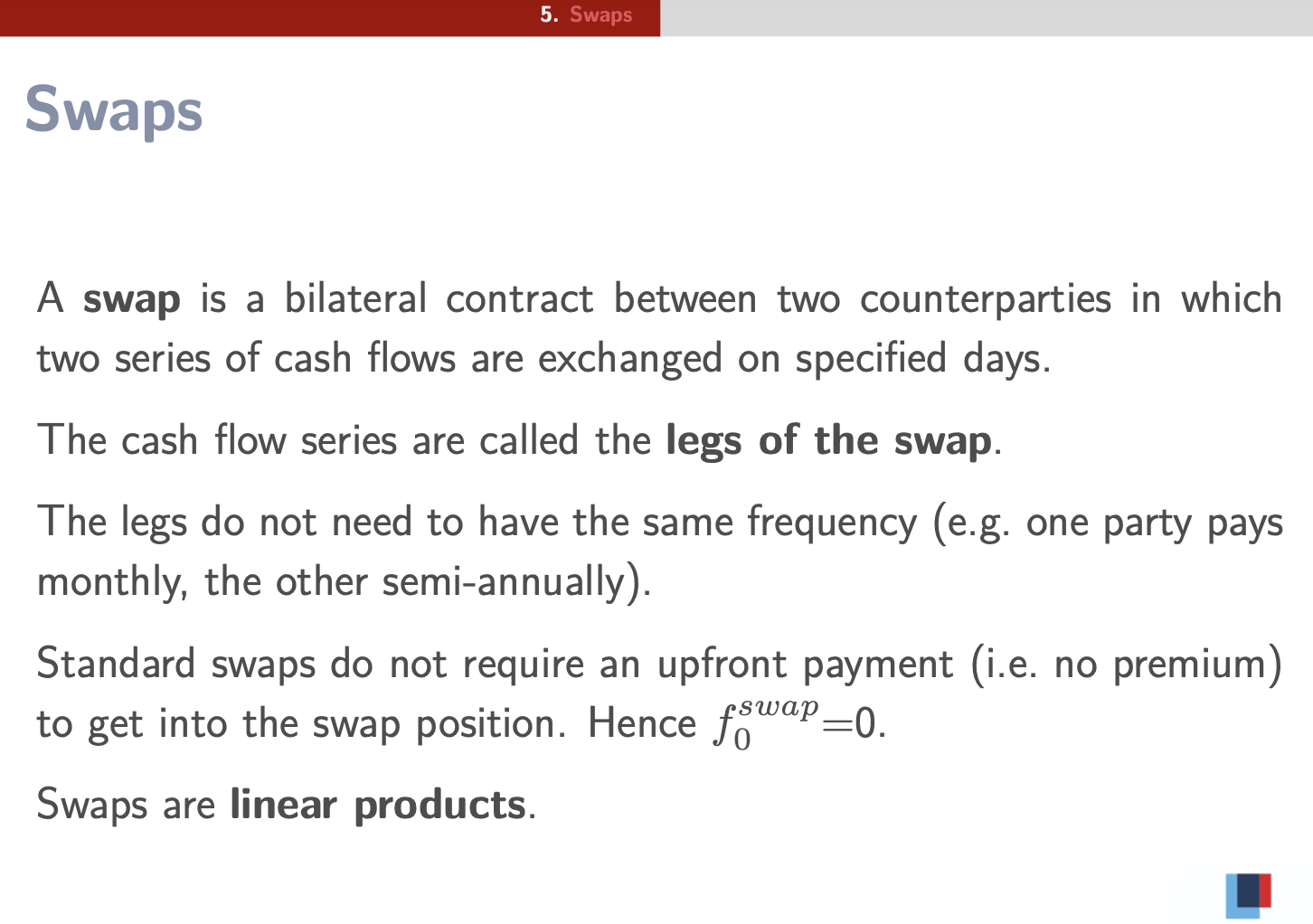IFM - Chapter 24 - The derivatives market
1/25
There's no tags or description
Looks like no tags are added yet.
Name | Mastery | Learn | Test | Matching | Spaced | Call with Kai |
|---|
No analytics yet
Send a link to your students to track their progress
26 Terms
Why do we need derivatives?
Increased demand for risk reduction
This leads to a need for financial innovation
Financial derivatives help managers reduce and manage risk effectively
What are financial derivatives?
Instruments with pay-offs linked to previously issued securities, used as risk-reduction tools.
What is a derivative (or contingent claim)?
A financial instrument whose payoff depends on one or more uncertain underlying variables.
What are the most important financial derivatives used to reduce risk?
Linear products: Forward contracts, Futures, Swaps
Non-linear products: Options
How are derivatives classified based on the underlying asset?
Equity derivatives
Interest rate derivatives
Currency derivatives
Commodity derivatives
Credit derivatives
Property derivatives
How are derivatives classified based on market nature?
Exchange traded
Over-the-counter (OTC)
Why are derivatives important?
Represent huge markets—multiple times world GDP
Help transfer risks efficiently
Embedded in many financial products
Real options enhance NPV by adding flexibility
Who uses derivatives?
Hedgers
Speculators
Arbitrageurs
What is a spot contract?
An agreement to buy/sell an asset at a set price for almost immediate delivery (within 3 days).
What is a long position in a spot contract?
Holding an asset with gains if the price increases.
What is short selling?
Selling borrowed securities to gain if the asset price falls.
What is a forward contract?
An OTC agreement to buy/sell an asset at a future date for a set delivery price.
What are the positions in a forward contract?
Long = obligation to buy
Short = obligation to sell
What are the delivery modes for forward contracts?
Physical delivery: for stocks, commodities, etc.
Cash settlement: used when physical delivery is impractical (e.g., indices)
Why trade forward contracts?
Hedging: manage future uncertainty (e.g., exchange/interest/commodity rates)
Speculation: profit without existing exposure
What are the main characteristics of a forward contract?
Bilateral and negotiated directly.
Highly customizable.
Settled at maturity.
Exposed to default risk.
Cannot be transferred unilaterally.
What is the payoff from a forward contract?
Net cash flow at maturity.
Equal to contract value at maturity.
It's a zero-sum game: gain/loss of one party = loss/gain of the other.
what does it mean that a forward is a linear product?
Payoff changes €1 for every €1 change in underlying price.
Payoff is a shifted version of the stock’s payoff profile.
What happens if the forward price ≠ delivery price?
Arbitrage opportunities arise:
If F > S: borrow S, buy S, short forward.
If F < S: short S, invest S, long forward.
Only arbitrage-free price is valid.
Market maker margin = bid-ask spread.
what is the main advantage of forward contracts?
Flexibility
→ Can completely hedge interest-rate risk of specific securities.
What are disadvantages of forward contracts?
Low liquidity: hard to find counterparties.
Default risk: must verify counterparty reliability.
Costly, risk of adverse selection and moral hazard.
What was the solution to forward contract limitations?
Introduction of futures contracts by CBoT in 1975.
How do futures differ from forwards?
Futures = exchange traded, standardized, and unilateral exit possible.
Default risk lies with exchange (vs. individual parties).
Managed via margin accounts (vs. collateral).
what two types of futures are there?
A distinction is being made between financial futures and commodity futures depending on the nature of the underlying.
what are swaps?
